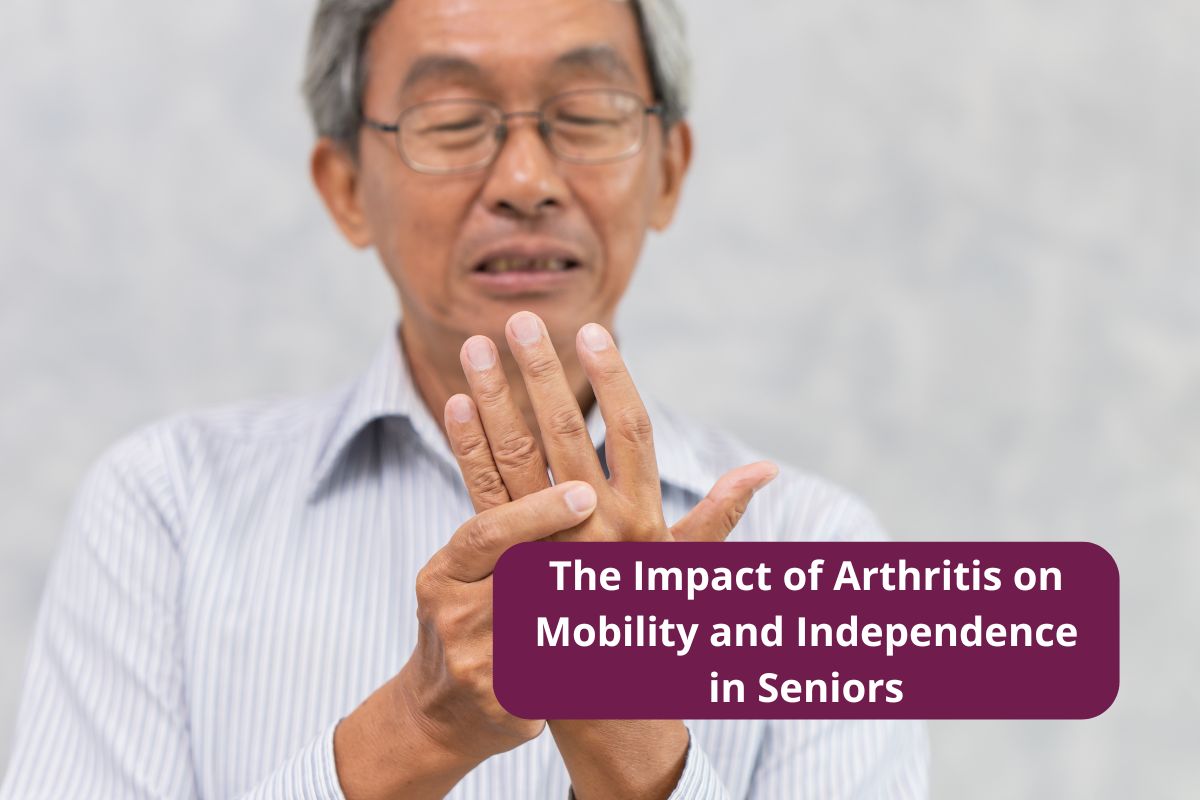When your elderly loved one is diagnosed with arthritis, it may be difficult for family and friends to know how to navigate this new journey alongside them.
Arthritis is the leading cause of disability in the United States, and this diagnosis may be overwhelming for some.
However, the more that we understand about arthritis in older adults and how it affects our loved ones, the more we can be of help to them.
Of course, arthritis affects the physical body of the patient, but it also impacts their social and emotional well-being, especially when they are so often unable to move around as fluidly and cannot be as independent as they once were.
Below, we’ll look at how arthritis can affect seniors’ mobility and independence and some ways that family members and professionals can help patients navigate these difficulties and improve their quality of life.
Physical Impacts
Arthritis refers to not just one single disease but a term for various joint pain conditions and diseases.
Patients' physical symptoms can vary from rather mild to extremely severe and debilitating. This chronic pain can take quite a toll on elderly patients who are affected.
Because it affects the joints directly, as the arthritis in older adults flares up or gets worse, a patient’s mobility and independence are directly affected.
They are also at a higher risk of falls, which makes their physical well-being a safety issue for loved ones and professionals in their circle. They may also experience a loss of strength and flexibility.
Read also: The Importance of Home Safety for Seniors with Arthritis
To help your loved ones with their physical limitations and symptoms, consider the following treatment plans with your loved one’s doctor:
Medication Options
Ask your loved one’s doctor what pain medication can best help their situation. Some medications can address the debilitating pain and give your loved one back the life they once had.
There may also be other types of medications, such as anti-inflammatory medicines, that may be available to treat arthritis in older adults.
Always consult a licensed medical professional when discussing these options with the patient.
Stretches and Exercises
There are certain stretches and exercises that can help move the sore muscles and joints in ways that can assist in pain management and mobility.
Light stretching, such as yoga, has proven to be accommodating to arthritis patients because of the slow and fluid nature of the activity.
Read also: Safe Exercises if You Have Arthritis
Social Impacts
The more pain they are in, the less they are able and/or motivated to move around. Performing simple daily tasks like showering, changing clothes, and others can be laborious.
Because of this, some elderly patients rely more on the assistance of others to help with these tasks, diminishing their sense of independence.
Furthermore, they may find themselves withdrawing from social activities. This social isolation, or loneliness, can negatively affect a patient’s physical and mental health, potentially causing many other symptoms to arise.
Involving your loved ones in daily activities with others can truly make a big difference in their daily life.
Consider involving a therapist or in-home caring service that can get your loved one moving in gentle ways and involved in activities in the public.
Also, having a reliable support system of family and friends for your loved one can improve their mood while providing assistance to them with the tasks that they need without becoming a burden. Assuring the patient that they are not a burden to you can go a long way!
Emotional Impacts
As you can imagine, a patient with excruciating pain in their joints can become quite discouraged, especially when they are unable to be as independent as they once were.
According to the CDC, it is estimated that 1 out of every 5 adults with arthritis also have symptoms of anxiety and depression.
The physicality of chronic pain can change the chemical makeup of one's brain, causing higher levels of stress hormones. All of this is compounded when a patient is unable to move as fluidly and independently.
When an arthritis patient is having trouble moving around, that can be quite discouraging, causing a lack of motivation.
That lack of motivation, in turn, can manifest into your loved one not wanting to get out of bed or their housing situation to be with others or in public situations.
Alternatively, the physical limitations can force those patients to be isolated, whether this is intentional or not of the patient.
This isolation can be extremely limiting on the psyche in either case. In fact, one study shows that an estimated 95% of arthritis patients reported feeling “excluded from social life.”
That same study reported that only 38% of their arthritis patients were “satisfied with their life.” Generalized sadness, a lack of interest in daily activities, and lack of energy are just a few of the symptoms of depression that arthritis patients may experience.
What’s difficult about comorbidities of depression and arthritis is that each can exacerbate the other. Meaning, one’s pain can increase their feelings of depression and anxiety. Likewise, depression and anxiety can lower one’s pain tolerance, making their pain worse over time.
These mental health conditions can seem the most difficult to overcome. However, there are some things that can help treat these symptoms. Be sure to bring these symptoms to your loved one’s physician’s attention.
There may be medication changes and/or additions that can be made. Also, some treatments that encourage physical healing and social interaction can also decrease feelings of sadness and loneliness.
Caring for an elderly loved one with arthritis requires a compassionate support system. More than stiff joints and aching pains, arthritis affects one's quality of life.
By surrounding your loved one with empathetic doctors, family, and friends, you can improve their comfort and daily functioning.
As a caregiver, your role is vital. Educate yourself about arthritis management and create a care plan that prioritizes your loved one's needs and preferences. With patience and teamwork, you can be an invaluable source of assistance.
Consider professional in-home care services like Home Instead when extra support is needed.
We offer a free, no-obligation care consultation to help you develop a personalized plan of arthritis care for your loved ones. If you are looking for in-home arthritis care in Lafayette, Youngsville, Broussard, St. Martin, and the surrounding areas, look no further than Home Instead!
Source:



